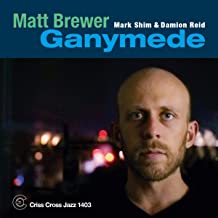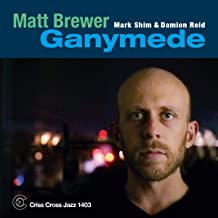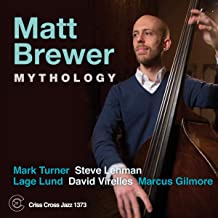-
Posts
13,205 -
Joined
-
Last visited
-
Donations
0.00 USD
Everything posted by Larry Kart
-

"Very Early: Bill Evans, 1956-58"
Larry Kart replied to ghost of miles's topic in Jazz Radio & Podcasts
Mel Lewis sold Mel Lewis' records; Creed Taylor sold Stan Getz's. It's not wholly art vs. commerce but more who had a running head start. Also, Mel's records sold in many respects because of things he did musically, conceptually, and organizationally; Creed was riding on the backs of others. Tell me the name of a musically important best-selling album or two where Creed's "call" made the big difference. Not saying there aren't some, but none come to mind. Well, Creed did go along with Stan Getz's insistence that Astrud Gilberto not be paid more than the session fee for singing "The Girl from Ipanema." Big plus there. -

"Very Early: Bill Evans, 1956-58"
Larry Kart replied to ghost of miles's topic in Jazz Radio & Podcasts
F**k Creed Taylor! Let's hear it for Herman Lubinsky! -

"Very Early: Bill Evans, 1956-58"
Larry Kart replied to ghost of miles's topic in Jazz Radio & Podcasts
Bill Kirchner responds: "It wasn’t Trio ’65, it was Trio ’64, with Peacock and Motian. Both reported (in a panel discussion of Evans sidemen I moderated for the booklet for the Verve 18-CD Evans box) that Taylor was an intrusive pain in the ass telling them how to play. This was a working group, mind you, so getting acceptable takes should have been easy. They said that eventually, they just “wanted to get the fuck out of there.” Too bad—that group no doubt was capable of a far more memorable album. I’ve heard mixed reports over the years about Taylor. Despite his undeniable successes, at his worst he seems to have been something of a control freak. Mel Lewis, for example, told me that Taylor wanted him to come in after the Pure Desmond date and overdub a substitute drum part for Connie Kay’s. Mel declined, and eventually the idea was abandoned because of potential leakage problems. -

"Very Early: Bill Evans, 1956-58"
Larry Kart replied to ghost of miles's topic in Jazz Radio & Podcasts
I'll ask Kirchner about it, but when you've got Evans, Motion, and Gary Peacock (of all people!) and Motion in the studio, what imaginable commercial direction could you have wanted them to take? Choice of material perhaps, but surely not how to play it? Peacock would have bounced his double bass off of Creed's noggin. -
Grosman is heard to quite good latter-day effect on this 1978 Rene Urtreger album (see below). Grossman is on six of the album's eleven tracks and iiRC is in very inventive relaxed form. Perhaps the fact that Urteger was older (b.1934), is a brilliant pianist, was the leader, and supplied a variety of heady frameworks (three of the tracks with Grossman include a small jazz-savvy string ensemble) served to take some pressure off Grossman.
-

"Very Early: Bill Evans, 1956-58"
Larry Kart replied to ghost of miles's topic in Jazz Radio & Podcasts
Truth be told, I can't think of an early Evans recording that was less than very good -- though I can't take the Tony Scott stuff because I can't take Scott and because IIRC much of that stuff has a shaggy/sloppy feel that works against Evans. BTW, to bring up Sngry's complaint about how Evans' left-hand voicings got all scrunched up and pounded out (I hear that too and agree with Jim, though I still can listen for other things amidst that compulsive barrage); when I returned yesterday to a few cuts from "Guys and Dolls Like Vibes" I was struck by the complete absence in Evans' playing of that, to Jim and me, annoying trait. In "early" days, Evans' sense of keyboard layout was strikingly lucid (if that's the right word), as much so as Teddy Wilson's. Speaking of Tony Scott, in the heyday of the Jazz Review, bassist Bill Crow wrote an absolutely scathing review of a Scott album -- not only zeroing in on Scott's more annoying musical traits but also attacking in some detail Scott's often fairly egomaniacal behavior on the stand and in the studio. (The review can be found online among the archived issues of the Jazz Review.) In any case, in the next or the next plus one issue of the JR, there's a letter from Evans that comes (I would say, tries to come) vigorously to Scott's defense. I say "tries to come" because while of course I can't read Evans ' mind, when I read that letter at the time the tone of it seemed a tense and bit unconvincing, like it was payback for all the early gigs that Scott gave Bill. BTW, speaking of that "Trio '65" album, Bill Kirchner, who interviewed the surviving particpoiants for his notes for the The Complete Evans on Verve box, said that Peacock and Motion hated that album and said that Evans did too -- in part because Creed Taylor was on Evans' ass throughout the date for some reason. -
Heck of a player, interesting composer. Mark Shim shines on "Ganymede," and Mark Turner likewise on "Mythology" (much to my surprise, I've been off Turner for a good while -- a live gig last year or so with one of the Cohen crew, the trumpeter, almost induced catatonia in me.
-

"Very Early: Bill Evans, 1956-58"
Larry Kart replied to ghost of miles's topic in Jazz Radio & Podcasts
Hey, I like early Evans -- indeed just about all Evans through the Lafaro/Motion trio. BTW, an early Evans outing I love is his playing on Eddie Costa's "Guys and Dolls Like Vibes"(was that the title or was it "...Likes Jazz"?) Costa plays great on it too. -

Help getting a musician hooked up w/ a good label
Larry Kart replied to Larry Kart's topic in Miscellaneous Music
How happy he is at age 48 or so in his relatively small European pond I don't yet know, which is why I raised these questions with him the other day and why I wonder now if I'm being an officious busybody. Maybe the has no particular desire to go through what he thinks he might have to go through to make a record or so that would be worthy of his gifts, or may be he thinks that his CD Baby efforts with the local B team are just fine. But knowing what he can do, it's not so much that I feel for him but that I feel for the art. It's not like he's Charlie Parker, but if you happened upon the young Bird and he said "Leave me alone with this Jay McShann stuff, I just want to hang out here with my wife and my mom" how would you feel? What this guy can do at his best is special; I know it. -

Help getting a musician hooked up w/ a good label
Larry Kart replied to Larry Kart's topic in Miscellaneous Music
Yes, I knew but I forgot. Sorry. -

Stone cold classic tracks post-Coltrane
Larry Kart replied to David Ayers's topic in Recommendations
I know the "jazz education spits out legions of cookie-cutter jazz nerds who will go on to spit out more of the same and will end up sitting in grotty apartments with pee-stains on their underwear" theme, but when I look at the bios of the young players who catch my ear, in almost every case they cleaved to the music well before than entered any jazz program and sure don't sound like they're clones of anyone. Maybe that was the case x number of years ago, but it's not what I hear these days. -
Recently I reconnected with an instrumental soloist whose first self-produced album mightily impressed me some 25 years. (I'm not going to mention his name for reasons that should become clear.) Years ago he moved to a non-major European country and has been making music there ever since. I just tracked down several of his recent CDs, and was delighted to find that he has evolved into a highly individual world-class player., which I suspect might be the case. Problem is that his CDs are literally or otherwise CD Baby-level products -- not that well recorded, seemingly rather casually produced, often with local players who are not in his league. Now I'm not this guy's mother or nursemaid, but I begin to gnash my teeth when think of how he'd sound on, say, on Criss Cross with some of that label's corps of players and with its top-notch sound, the latter especially because this guy is a "sound" player par excellence. I asked him yesterday in a e-mail whether there are no good studios accessible to him where he lives, or is the problem there primarily financial, and I have yet to hear back. I also told him that somehow he needs to find better people to play with. (It's not so much that they're not that good but that they take their little apprentice solos and then tiptoe timidly into the woodwork, while this guy's music calls for forthright group interaction.) If I could pull Gerry Teekens' coat to him, or pull the coat of anyone else of that nature and stature in the business, Teekens et al. might all agree with me that this guy is indeed a world-class player who deserves a shot. Anyone have any ideas of how I might proceed here? He does have CDs that could be auditioned. Or am I just being an officious busybody.
-

Stone cold classic tracks post-Coltrane
Larry Kart replied to David Ayers's topic in Recommendations
But there's a consistent flow of young -- and in many cases highly talented and innovative -- musicians emerging. Does the existence of this "base" (if you will) count for nothing? To sharpen the point a bit, if the music is as near moribund or worse as you think it is, what accounts for the phenomenon I've just described. Are secret agents paying these guys to devote their lives to the music and somehow programming their minds al la Dr. Frankenstein so that they play in what seems to many to be a worthwhile innovative manner? Or is something going on here that may (or may not) bear significant fruit down the road? No, no one is making cash on the barrelhead from jazz these days, but (old TV kiddie show reference) its "magic twanger" is still being plunked with some regularity, and as long as it continues to vibrate , tales of jazz's irrelevance or impending doom are just tales. P.S. Ah, yes, the heyday of the Swing era. The last truly major jazz musician who was, without making compromises, widely popular was IMO Errol Garner. Garner had his shtick but it was wholly genuine , self-invented, and musically worthwhile. Some will say Brubeck -- I don't dismiss him myself but wouldn't put him in that category; not a major figure musically. The MJQ would qualify and maybe the initial Mulligan Quartet, but their audiences weren't populous or broad enough. Don't have figures on this, but I think that the percentage of Americans, and people in other lands, who knew and dug Garner on his own terms was considerable and long-lasting. -
Bless my good luck then. I should add that I was accompanied that night by a friend who has the best ears for jazz I know, and he had the same impression I did. Also, Tal was backed by a very good Chicago bass and drum team -- the bassist probably was Larry Gray, the very fluid bop-oriented drummer (not unlike Billy Higgins) was the late Robert Shy. I had the impression that Tal found Shy stimulating, as well he might. FWIW, the club -- its name was George's -- was a pleasant place with a listening audience and good acoustics. Wish I could find the review I wrote of that performance, but I no longer have access to the Chicago Tribune's Archives.
-
I don't agree about Farlow. Yes, he falters on some of those later albums, but I heard him live in Chicago in the late '80s, and he was jaw-droppingly brilliant in every way. It was like listening to Tatum. BTW., in the passage sgcim quoted, I meant that Michael Moore should have quit the Evans trio after that performance (he did quit eventually, in part because he couldn't stand the rushing), not that Evans himself should have quit playing. Drugs can be expensive.
-

Stone cold classic tracks post-Coltrane
Larry Kart replied to David Ayers's topic in Recommendations
I looked at this thread two ways -- tracks that already were/are acknowledged classics and tracks of such quality that they deserved to be regarded as classic. My nominee, Bobby Hutcerhson's "My Joy" was in the latter category and all the more relevant for that IMO -- because its beauty may be new to many. -

Stone cold classic tracks post-Coltrane
Larry Kart replied to David Ayers's topic in Recommendations
Coltrane d. July 17, 1967. Bobby Hutcherson, ""My Joy," rec. July 21, 1967 (from the album Oblique," not released until 1980): Hutcherson, Herbie Hancock, Albert Stinson, Joe Chambers Cascading Hutcherson, Gorgeous Herbie solo, jaw-dropping one from the late Albert Stinson (that's sort of like what Russell Thorne sounded like) and sublime support from Joe Chambers 0; -
He should have quit after this performance.
-
Moore with his former wife Anita Gravine, one of my favorite singers. Just to be fair, a better showcase for Anita: Dig her time, Mike Abene's arrangement, and Anita's breaks at the end:
-
Doesn't look like an excellent bass player, does he? Evans, Moore, and Philly Joe. Moore might have quit after this performance: Moore in better circumstances:
-
Point Game (Owl, 1990) The Luxury of Guessing (AudioQuest, 1995) Free to Dream (Mythology, 1998) Afinidad with Edward Simon (Red, 2001) South (ACT, 2001) Balance (ACT, 2002) A Small Madness with Jeff Hirshfield (Auand, 2003) Welcome to Life (Mythology, 2004) Fiestas de Agosto with Edward Simon (Red, 2005) Bastion of Sanity (Criss Cross, 2005) This Life with Mario Franco (Tone of a Pitch, 2006) Cities and Desire (Criss Cross, 2006) Out of Airplanes (Mythology, 2006) Oceanos with Edward Simon (Criss Cross, 2007) In the Paint with Alan Ferber (Posi-Tone, 2009) Third Occasion (Mythology, 2009) Aliso (Criss Cross, 2010) Barefooted Town (Criss Cross, 2011) Graylen Epicenter (Mythology, 2011) Lifted Land (Criss Cross, 2013) Anacapa (Criss Cross, 2014) R&B with Adam Rogers (Criss Cross, 2015) The Time Verses (Criss Cross, 2017) Zinc City with Manuel Engel (Metonic, 2018) With Lan Xang Hidden Gardens (Naxos, 2000) With Lost Tribe Lost Tribe (Windham Hill, 1993) Soulfish (High Street, 1994) Many Lifetimes (Arabesque, 1998) As sideman[edit] With Uri Caine Urlicht / Primal Light (Winter & Winter, 1997) Gustav Mahler in Toblach (Winter & Winter, 1999) With Scott Colley Portable Universe (Free Lance, 1996) Architect of the Silent Moment (CAM Jazz, 2007) With John Escreet Consequences (Posi-Tone, 2008) Don't Fight the Inevitable (Mythology, 2010) Exception to the Rule (Criss Cross, 2011) The Age We Live In (Mythology, 2011) Sabotage and Celebration (Whirlwind, 2013) With Joel Harrison Free Country (ACT, 2003) So Long 2nd Street (ACT, 2004) Harbor (HighNote, 2007) The Wheel (Intuition, 2008) Urban Myths (HighNote, 2009) Multiplicity: Leave the Door Open (Whirlwind, 2014) With Donny McCaslin The Way Through (Arabesque, 2003) In Pursuit (Sunnyside, 2007) Perpetual Motion (Greenleaf, 2010) Casting for Gravity (Greenleaf, 2012) Fast Future (Greenleaf, 2015) Beyond Now (Motema, 2016) With Miles Okazaki Mirror (2006) Generations (Sunnyside, 2009) With Samo Salamon Ela's Dream (Splasc(h) Records, 2005) Government Cheese (Fresh Sound New Talent, 2006) With Edward Simon La Bikina (Red, 2011) Sorrows & Triumphs (Sunnyside, 2018) With Alex Sipiagin Images (TCB, 1998) Equilibrium (Criss Cross, 2004) Destinations Unknown (Criss Cross, 2011) Balance (Criss Cross, 2015) With others Anthony Branker, The Forward (Towards Equality) Suite (Origin, 2014) Vinicius Cantuaria, Cymbals (Naive, 2007) David Gilmore, Ritualism (Kashka Music 2000) Drew Gress, Heyday (Soul Note, 1998) Wayne Krantz, Howie 61 (Abstract Logix, 2012) Nguyen Le, Songs of Freedom (ACT, 2011) Joe Locke, Subtle Disguise (Origin, 2018) Medeski Martin & Wood, It's a Jungle in Here (Gramavision, 1993) Virgil Moorefield, Distractions on the Way to the King's Party (Cuneiform, 1994) Lonnie Plaxico, Short Takes (Muse, 1992) Chris Potter, Traveling Mercies (Verve, 2002) Antonio Sánchez, New Life (CAM Jazz, 2013)
-
I should add that based on all that I've heard of Binney -- sampled a fair bit rather than pored over -- that while I don't flat out dislike his solo work, I'm either puzzled by or just don't get its flightiness, so to speak, its relatvely insistent sense of agitation/lack of repose -- and this air of flightiness/agitation without much if any sense of an ebb and flow of intensity. Seems to me at this point of my befuddlement that Binney is more a composer -- perhaps better, an assembler of shapes and episodes -- than a player per se. Depending on the piece, these shapes and episodes do, for me, accumulate more meaningfully than Binney's solo lines, though the way they do accumulate when they do is, I find, kind of funny/peculiar, kind of like if you were sitting outside in a chair you couldn't move from while an insect keeps buzzing around your head for 10 or so minutes. There's a certain coherence to the experience, but is it one you'd seek out?
-
About how bad Evans was getting, there was at least one moment of possible enlightenment -- when the estimable Michael Moore was Evans' bassist and Philly Joe Jones his drummer. Given the combined degree of rushing from the piano bench and the drum chair, Moore soon found the situation musically impossible and flat out quit. If a Michael Moore tells me that, I might have a thought or two about what was going on, but apparently not.
-
In recent years, mostly at random through library sales, I've acquired a fair number of Binney's CDs, and while never really put off by his music, I've yet to be drawn to it either -- or, more important, haven't even gotten what seems to me to be a sure enough grasp on what it is he's up to as an improviser and composer to make a reasonable judgment. Can anyone weigh in on Binney and maybe help me?
-
sgcim: I'll take a look Beradinelli's study if I can find it (where and how might I do that?), but if you're saying or implying that an academic thesis carries enough weight in itself to settle the matter once for all, one can find an academic thesis to support just about any aspect of any issue of aesthetic taste/judgment imaginable. As for Glenn Gould, he loved Richard Strauss' "Enoch Arden."
_forumlogo.png.a607ef20a6e0c299ab2aa6443aa1f32e.png)




